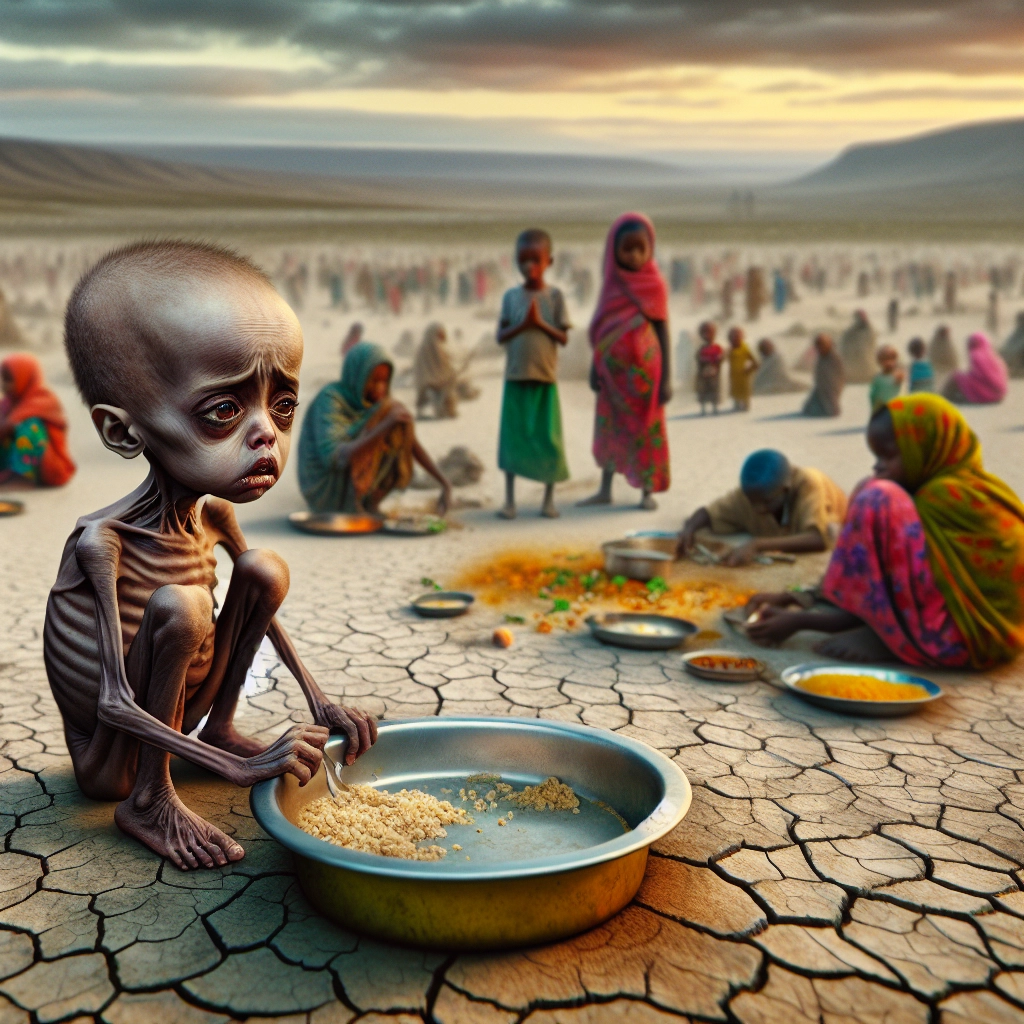

Food shortage occurs when there is not enough food available to meet the demand of the population. Understanding the effects of food shortage is important to address the impact it has on individuals, communities, and the global population as a whole.
Food shortage has far-reaching effects on the physical and mental health of individuals, leading to malnutrition, stunted growth, and increased susceptibility to diseases. In addition, food shortage can also result in social and economic instability, leading to food insecurity, poverty, and conflict within communities and across nations.
By understanding the effects of food shortage, it becomes possible to take proactive measures to address and mitigate its impact, ensuring that adequate food supply is available to meet the needs of all individuals and communities. This understanding also enables the development of sustainable and resilient food systems to prevent future food shortages and their associated consequences.
Check out this Youtube video: Interested in understanding the potential global impact of food shortage? Watch this video to learn about the 5 effects of food shortage and gain insight into the future of food security.
Impact on Health
Malnutrition and its consequences
Malnutrition, stemming from food shortage, leads to a range of serious consequences, particularly for children. It can result in wasting, stunting, underweight, and deficiencies in crucial vitamins and minerals, making them extremely vulnerable to diseases and even death.
Specifically, low weight-for-height, known as wasting, can indicate recent and severe weight loss due to insufficient food intake, or an infectious disease like diarrhoea. This undernutrition significantly heightens the risk of mortality and morbidity among children, posing a grave concern in food shortage scenarios.
Increased susceptibility to diseases and infections
Food shortage exacerbates the risk of infections and diseases due to malnutrition. Insufficient dietary intake weakens the immune system, making individuals more susceptible to various infections.
Malnutrition instigates a vicious cycle where inadequate dietary intake leads to weight loss, compromised immunity, mucosal damage, and susceptibility to invasion by pathogens. This, in turn, impairs growth and development in children and elevates the risk of infectious diseases such as diarrhoea, measles, meningitis, tuberculosis, influenza, and bacterial pneumonia.
Impact on physical and mental development
The impact of food shortage-induced malnutrition extends to both physical and mental development, with far-reaching ramifications. Children exposed to severe acute malnutrition during early life often face poor cognitive function and diminished school achievement.
Moreover, prenatal malnutrition has been linked to aberrant fetal brain development, with evidence suggesting a heightened vulnerability to developing schizophrenia in adolescence and adulthood. Thus, the consequences of food shortage on physical and mental development are profound, necessitating urgent and comprehensive interventions to mitigate its long-term effects.
Impact on Society
Increased poverty and inequality
The effects of food shortage contribute to a substantial increase in poverty and inequality within societies. When individuals and communities lack access to an adequate food supply, it often leads to financial strain and the inability to meet basic needs.
This exacerbates existing socioeconomic disparities, as those already facing economic challenges experience amplified hardships due to the scarcity of food resources.
Social unrest and conflicts
Food shortage has been directly linked to social unrest and conflicts in many parts of the world. When communities face scarcity and lack of access to food, tensions rise, and conflicts can erupt.
Desperation and frustration stemming from inadequate food supplies often lead to social turmoil, protests, and even violent confrontations. Such unrest can have far-reaching consequences, impacting the stability and security of entire regions.
Economic implications and loss of productivity
The economic implications of food shortage are profound, with significant impacts on productivity and overall economic stability. In regions grappling with food scarcity, productivity levels plummet as malnutrition takes a toll on workforce health and well-being.
This results in reduced labor output, decreased economic growth, and heightened financial strains on both individuals and local economies. Moreover, the long-term effects of food shortage can hinder sustainable development and perpetuate cyclical poverty.
Effects on Children
When children experience food shortage, it can have long-term impacts on their physical and cognitive development. Nutritional deficiency during key developmental stages can lead to stunted growth, weakened immune systems, and impaired cognitive function.
This can hinder their ability to thrive and reach their full potential in adulthood.
Long-term impact on physical and cognitive development
The lack of essential nutrients due to food shortage can lead to chronic health issues, cognitive impairments, and developmental delays. Children may experience stunted growth, decreased bone density, and impaired brain development, affecting their physical and cognitive abilities in the long run.
Educational outcomes and future opportunities
Food shortage can significantly impact a child’s educational outcomes and future opportunities. Malnutrition and hunger can hinder cognitive development, leading to poor academic performance, reduced learning capacity, and limited career prospects in the future.
This deprivation of essential nourishment could potentially limit their overall potential and success in various areas of life.
Impact on Agriculture
Decreased food production and agricultural productivity
According to recent studies, climate change poses a significant threat to food production and agricultural productivity. The increase in extreme weather events, such as heavy precipitation, can erode soil and deplete soil nutrients, leading to decreased crop yields.
This poses a major challenge to farmers and can result in food shortages due to the reduced availability of agricultural products.
Displacement of populations and rural migration
The impact of climate change and food shortage is not limited to agricultural productivity alone. It also leads to the displacement of populations and rural migration.
As areas become increasingly uninhabitable due to environmental degradation and reduced agricultural output, people are forced to leave their homes and seek new living environments. This phenomenon has far-reaching implications, affecting social structures, cultural dynamics, and economic stability.
Psychological Effects
Increased anxiety and stress resulting from food shortage can have a profound impact on individuals’ mental well-being. The uncertainty and fear of not having enough to eat can lead to heightened levels of anxiety, causing individuals to experience constant worry and restlessness.
The stress induced by food insecurity can lead to a range of mental health issues, including anxiety disorders and panic attacks, exacerbating the overall psychological burden.
Mental health implications and trauma from food insecurity go beyond the immediate physical effects. The experience of not having enough food can lead to significant emotional distress, contributing to the development of trauma-related symptoms.
Individuals facing food shortages may struggle with feelings of helplessness, hopelessness, and despair, further intensifying the psychological toll and potentially leading to long-term psychological trauma.
| Psychological Effects of Food Shortage |
|---|
| * Increased anxiety and stress |
| * Mental health implications and trauma |
Food shortage doesn’t just impact physical health; it inflicts significant distress on mental well-being, emphasizing the need for comprehensive support and resources to address the psychological effects of food insecurity.
Food Shortage and Global Hunger
Contributing factors to food shortage at a global level
The contributing factors to food shortage at a global level are multifaceted and complex. The primary drivers of food shortage include conflict, climate change, economic instability, and soaring food prices.
These factors disrupt agricultural production, hinder trade, and exacerbate the vulnerability of communities, leading to an inadequate supply of food. For example, regions affected by armed conflict experience widespread destruction of infrastructure and agricultural lands, severely impeding food production and distribution.
Additionally, climate change-induced extreme weather events, such as droughts and floods, further diminish crop yields, exacerbating food scarcity.
Implications for global hunger and poverty
The implications of food shortage on global hunger and poverty are dire, exerting a profound impact on the physical and mental well-being of individuals and communities. Chronic hunger stemming from food shortages can lead to malnutrition, which poses a severe threat to overall health and child development.
Furthermore, insufficient access to nutritious food perpetuates the cycle of poverty, as individuals resort to purchasing cheaper, less nutritious alternatives. This not only compromises their health but also perpetuates long-term consequences, particularly among young children.
The compounding effects of food shortage contribute to a widening socioeconomic disparity and further exacerbate global hunger and poverty.
| Contributing Factors | Implications |
|---|---|
| Conflict | Chronic Hunger |
| Climate Change | Malnutrition |
| Economic Instability | Poverty |
| Soaring Food Prices | Socioeconomic Disparity |
Impact on Food Distribution
Disparities in food access and distribution have profound effects on communities, leading to unequal access to essential nutritional resources. This inequality creates a ripple effect, impacting various aspects of individuals’ lives, from health to economic stability.
For example, in disadvantaged communities, limited access to fresh and healthy foods can result in higher rates of diet-related health issues, perpetuating a cycle of poor health outcomes.
Vulnerable populations and marginalized communities face the brunt of these disparities, struggling to meet their basic nutritional needs. For instance, racial and ethnic minority groups, as well as economically disadvantaged individuals, often experience heightened food insecurity, hindering their ability to maintain a balanced and healthy diet.
Addressing these disparities is crucial for promoting equal opportunities for all individuals to access nutritious food, thereby improving overall well-being.
Environmental Impact
The effects of food shortage have led to severe environmental consequences, including deforestation and land degradation. As the demand for agricultural land increases to meet food needs, forests are being cut down at an alarming rate.
The net loss in forests globally was 4.7 million hectares per year, significantly contributing to deforestation. This rampant deforestation leads to land degradation, with soil erosion and the loss of arable land becoming increasingly prevalent.
These adverse effects are a direct result of the urgent need to expand agricultural practices to combat food shortage, harming the environment in the process.
Unsustainable agricultural practices further exacerbate the environmental impact of food shortage. Soil erosion and desertification are direct consequences of unsustainable farming, resulting in a decline in land productivity.
This perpetuates the cycle of soil loss, prompting agricultural producers to clear more forest areas for cultivation, thus continuing the cycle of environmental degradation. Additionally, the overgrazing of agricultural livestock, notably forage lands, leads to the inability of grasses to regenerate and contributes to destabilizing the environment.
The environmental impact of food shortage is evident in the rapid deforestation and land degradation caused by the expansion of agricultural practices. Though necessary to address food scarcity, these practices have led to severe environmental consequences, highlighting the need for sustainable and responsible approaches to agriculture.
| Key Points |
|---|
| – Deforestation rates escalate to 10 million hectares annually |
| – Land degradation results from unsustainable farming practices |
| – Overgrazing of livestock intensifies environmental instability |
Recommended Amazon Products for Mitigating the Effects of Food Shortage
Here’s a curated list of products that can help mitigate the effects of food shortage with ease. These recommendations are based on relevance to the impacts of food shortage, functionality, and positive customer reviews.
Nutrient-Dense Food Supplements
These supplements are packed with essential vitamins, minerals, and nutrients that can help combat malnutrition and support overall health and well-being. Additionally, they can provide a convenient source of nutrition during times of food scarcity.
| Pros | Cons |
|---|---|
| Provides essential nutrients | May be expensive for some |
| Convenient and easy to store | Some individuals may have allergies |
| Variety of options available | Not a substitute for a balanced diet |
Water Filtration Systems
Access to clean water is crucial, especially during food shortages when hygiene and sanitation may be compromised. These filtration systems can ensure a safe and sustainable water supply for drinking and cooking.
| Pros | Cons |
|---|---|
| Removes impurities and contaminants | Initial investment cost |
| Long-term cost savings compared to bottled water | Requires regular maintenance |
| Suitable for emergency preparedness | Limited capacity for larger households |
Non-perishable Food Supplies
Stocking up on non-perishable food items such as canned goods, dried fruits, and shelf-stable meals can help maintain food security during shortages. These products have a long shelf life and provide essential nutrients.
| Pros | Cons |
|---|---|
| Long shelf life | Limited variety of fresh produce |
| Convenient for emergency situations | Requires storage space |
| Easy to prepare and consume | May contain added preservatives |
Home Gardening Kits
Promoting agricultural productivity at a household level, these kits enable individuals to grow their own fruits, vegetables, and herbs. This can help mitigate the impact of food shortage by providing a sustainable food source.
| Pros | Cons |
|---|---|
| Sustainable food source | Time and effort required for maintenance |
| Educational and rewarding | Subject to weather and growing conditions |
| Encourages self-sufficiency | Initial setup cost and space limitations |
Solar-Powered Generators
In regions affected by food shortage, reliable access to electricity may be limited. Solar-powered generators can ensure continuous power supply for cooking, refrigeration, and communication during emergencies.
| Pros | Cons |
|---|---|
| Renewable energy source | Initial investment cost |
| Environmentally friendly | Dependence on sunlight availability |
| Low maintenance and operating costs | Limited capacity for high-energy devices |
Top Recommended Product for Mitigating the Effects of Food Shortage
If you’re looking for the best solution to mitigate the effects of food shortage, we highly recommend Nutrient-Dense Food Supplements (https://www.amazon.com/s?k=nutrient+dense+food+supplements). These supplements offer essential nutrients and convenience in addressing nutritional needs during food scarcity. Ready to improve your food security? Check out Nutrient-Dense Food Supplements today for the best results!


Conclusion
Food shortage has a significant impact on people’s health. Malnutrition and stunted growth are common consequences of not having enough food, leading to long-term health issues and decreased productivity in the affected population.
Additionally, food scarcity can also lead to an increase in food prices, making it difficult for those already struggling to afford essential nutrition.
Furthermore, food shortage can also trigger social and political instability. Scarcity of food can cause conflicts over resources, leading to violence and displacement of communities.
Moreover, it can also result in political unrest as governments struggle to meet the needs of their citizens and maintain social order in the face of food shortages.
In addition, food scarcity can have a detrimental impact on the economy. With inadequate food supplies, agricultural productivity decreases, leading to a decline in income for farmers and reduced economic growth for the country as a whole.
This can perpetuate a cycle of poverty and further exacerbate the effects of food shortage on the population.










